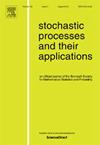Compound Poisson distributions for random dynamical systems using probabilistic approximations
IF 1.1
2区 数学
Q3 STATISTICS & PROBABILITY
引用次数: 0
Abstract
We obtain quenched hitting distributions to be compound Poissonian for a certain class of random dynamical systems. The theory is general and designed to accommodate non-uniformly expanding behavior and targets that do not overlap much with the region where uniformity breaks. Based on annealed and quenched polynomial decay of correlations, our quenched result adopts annealed Kac-type time-normalization and finds limits to be noise-independent. The technique involves a probabilistic block-approximation where the quenched hit-counting function up to annealed Kac-normalized time is split into equally sized blocks which are mimicked by an independency of random variables distributed just like each of them. The theory is made operational due to a result that allows certain hitting quantities to be recovered from return quantities. Our application is to a class of random piecewise expanding one-dimensional systems, casting new light on the well-known deterministic dichotomy between periodic and aperiodic points, their usual extremal index formula , and recovering the Polya–Aeppli case for general Bernoulli-driven systems, but distinct behavior otherwise.
使用概率近似值的随机动力系统复合泊松分布
我们得到了某类随机动力系统的淬火命中分布是复合泊松的。该理论具有普遍性,可适用于非均匀扩展行为以及与均匀性破坏区域重叠不多的目标。基于相关性的退火和淬火多项式衰减,我们的淬火结果采用了退火 Kac 型时间归一化,并发现极限与噪声无关。该技术涉及一种概率块近似方法,即将退火 Kac 归一化时间内的淬火命中计数函数分割成大小相等的块,这些块由分布与每个块相同的独立随机变量模拟。由于一个结果允许从返回量中恢复某些命中量,因此该理论具有可操作性。我们将其应用于一类随机片断扩展的一维系统,为众所周知的周期点和非周期性点之间的确定性二分法、其通常的极值指数公式 EI=1-1/JTp(x0)、恢复一般伯努利驱动系统的 Polya-Aeppli 情况以及其他不同行为提供了新的启示。
本文章由计算机程序翻译,如有差异,请以英文原文为准。
求助全文
约1分钟内获得全文
求助全文
来源期刊

Stochastic Processes and their Applications
数学-统计学与概率论
CiteScore
2.90
自引率
7.10%
发文量
180
审稿时长
23.6 weeks
期刊介绍:
Stochastic Processes and their Applications publishes papers on the theory and applications of stochastic processes. It is concerned with concepts and techniques, and is oriented towards a broad spectrum of mathematical, scientific and engineering interests.
Characterization, structural properties, inference and control of stochastic processes are covered. The journal is exacting and scholarly in its standards. Every effort is made to promote innovation, vitality, and communication between disciplines. All papers are refereed.
 求助内容:
求助内容: 应助结果提醒方式:
应助结果提醒方式:


